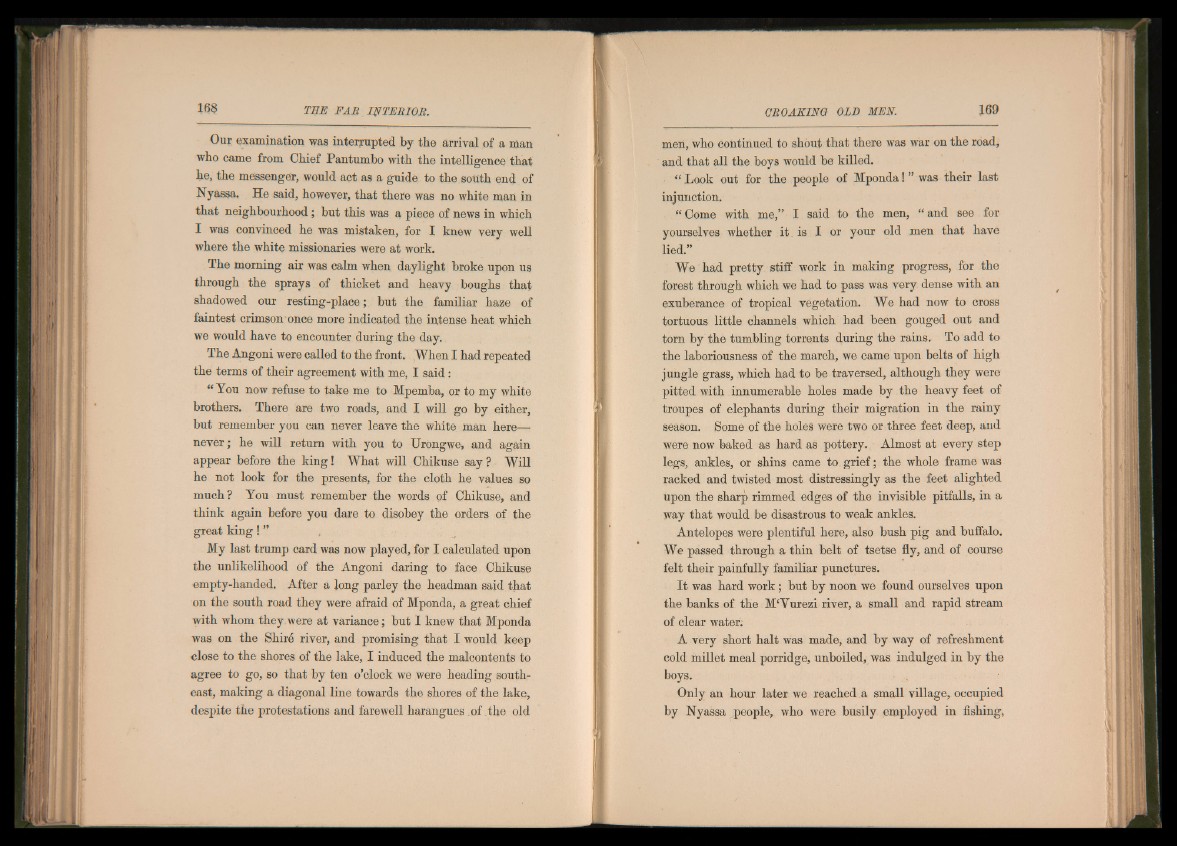
Our examination was interrupted by tbe arrival of a man
who came from Cbief Pantumbo with tbe intelligence that
be, tbe messenger, would act as a guide to tbe south end of
Nyassa. He said, however, tbat there was no wbite man in
tbat neighbourhood; but this was a piece of news in which
I was convinced he was mistaken, for I knew very well
where the white missionaries were at work.
The morning air was calm when daylight broke upon us
through the sprays of thicket and heavy boughs that
shadowed our resting-place; but the familiar haze of
faintest crimson once more indicated the intense heat which
we would have to encounter during the day.
The Angoni were called to the front. When I had repeated
the terms of their agreement with me, I said:
“ You now refuse to take me to Mpemba, or to my white
brothers. There are two roads, and I will go by either,
but remember you can never leave the white man here—
never; he will return with you to Urongwe, and again
appear before the k in g ! What will Chikuse say ? Will
he not look for the presents, for the cloth he values so
much? You must remember the words of Chikuse, and
think again before you dare to disobey the orders of the
great k in g ! ”
My last trump card was now played, for I calculated upon
the unlikelihood of the Angoni daring to face Chikuse
empty-handed. After a long parley the headman said that
on the south road they were afraid of Mponda, a great chief
with whom they were at variance; but I knew that Mponda
was on the Shire river, and promising that I would keep
close to the shores of the lake, I induced the malcontents to
agree to go, so that by ten o’clock we were heading southeast,
making a diagonal line towards the shores of the lake,
despite the protestations and farewell harangues of the old
men, who continued to shout that there was war on the road,
and that all the boys would be killed.
■ “ Look out for the people of Mponda! ” was their last
injunction,
“ Come with me,” I said to the men, “ and see for
yourselves whether i t . is I or your old men that have
lied.”
We had pretty stiff work in making progress, for the
forest through which we had to pass was very dense with an
exuberance of tropical vegetation. We had now to cross
tortuous little channels which had been gouged out and
torn by the tumbling torrents during the rains. To add to
the laboriousness of the march, we came upon belts of high
jungle grass, which had to be traversed, although they were
pitted with innumerable holes made by the heavy feet of
troupes of elephants during their migration in the rainy
season. Some of the holes were two or three feet deep, and
were now baked as hard as pottery. Almost at every step
legs, ankles, or shins came to grief; the whole frame was
racked and twisted most distressingly as the feet alighted
upon the sharp rimmed edges of the invisible pitfalls, in a
way that would be disastrous to weak ankles.
Antelopes were plentiful here, also bush pig and buffalo.
We passed through a thin belt of tsetse fly, and of course
felt their painfully familiar punctures.
I t was hard work ; but by noon we found ourselves upon
the banks of the MWurezi river, a small and rapid stream
of clear water:
A very short halt was made, and by way of refreshment
cold millet meal porridge, unboiled, was indulged in by the
boys.
Only an hour later we reached a small village, occupied
by Nyassa ^people, who were busily employed in fishing,